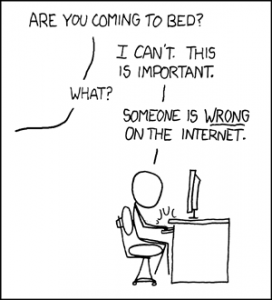…don’t bother rebuking mockers; they will only hate you. But the wise, when rebuked, will love you all the more. -Proverbs 9:8
Following up on my post a few weeks ago, ‘Calling Out’ or Cannibals, I’ve spent a lot of time thinking about this issue and have a few things to share that in no way are exhaustive or definitive. This is one of those issues that each of us is going to have to wrestle with and decide what does and doesn’t violate our integrity and honors God.
Here we go…
1. There are times when Christians need to call each other out.
There are tons of examples of this in the New Testament, my favorite is this example of Paul rebuking Peter in Galatians 2
“11But when Cephas came to Antioch, I opposed him to his face, because he stood self-condemned; 12for until certain people came from James, he used to eat with the Gentiles. But after they came, he drew back and kept himself separate for fear of the circumcision faction. 13And the other Jews joined him in this hypocrisy, so that even Barnabas was led astray by their hypocrisy. 14But when I saw that they were not acting consistently with the truth of the gospel, I said to Cephas before them all, “If you, though a Jew, live like a Gentile and not like a Jew, how can you compel the Gentiles to live like Jews?” 15We ourselves are Jews by birth and not Gentile sinners; 16yet we know that a person is justified not by the works of the law but through faith in Jesus Christ. And we have come to believe in Christ Jesus, so that we might be justified by faith in Christ, and not by doing the works of the law, because no one will be justified by the works of the law. 17But if, in our effort to be justified in Christ, we ourselves have been found to be sinners, is Christ then a servant of sin? Certainly not! 18But if I build up again the very things that I once tore down, then I demonstrate that I am a transgressor. 19For through the law I died to the law, so that I might live to God. I have been crucified with Christ; 20and it is no longer I who live, but it is Christ who lives in me. And the life I now live in the flesh I live by faith in the Son of God, who loved me and gave himself for me. 21I do not nullify the grace of God; for if justification comes through the law, then Christ died for nothing.”
2. Not every instance should be called out by every person all the time.

Not only would this he unhelpful, but it would be impossible. Spend any amount of time on facebook, twitter, or the blogosphere and you’ll encounter numerous instances of wrong-headed thought, unfair generalization, and trite shallow theology. Frankly, you wouldn’t get anything done if you decided to take it all on, and it. would. never. end!
Brothers and sisters, please, let’s not be those people who are always angry because someone is wrong on the internet.
Sometimes the best course of action is to hit the “unfollow” or “unfriend” button.
Questions to ask yourself…
Does this warrant rebuke?
Am I the person to do the rebuking?
3. Humility, Humility, Humility!
Maybe this should be number 1 on the list.
Remember that time you were wrong about something and some condescending jerk caused you to see the errors of your ways? Yeah me neither.
During my 20’s (I’m 30 now), my theology went through a wonderful evolution. At 19 I believed some things that I (and many of you) now consider oppressive and unbiblical. I didn’t grow, because rude and angry people yelled me into correct thinking. I am supremely grateful for loving, kind and patient people who listened to my thoughts, and gently showed me where I had gone wrong.
I have to keep my former self in mind, when encountering people in need of rebuke and correction. It’s hard for me to think of them as malicious and unloving, because many times they are just being faithful to who they think God is, however wrong that may be.
A note here – I realize that not all people who need to be confronted are “just being faithful to who they think God is.” I realize that many are just toxic and have no defense. My time and intellect prevent me from outlining every possible scenario, saying who and what goes into which category, but most of us have the discernment to know which is which.
4. The error should be attacked (for lack of a better word), not the person.
If the crux of your argument is that someone is a bad person, it’s a good sign that you might not be speaking in love, and that should always be a goal of the Christ-follower.
I decided to take https://medtecllc.com/ativan-online/ pill early in the morning, as soon as I woke up.
Has that method ever been fruitful? Has anyone ever accepted this kind of rebuke?
My worry is that often times when we argue, we care more about being right, than pulling someone else into correct understanding of God. This of course goes back to humility.
5. If someone has given you the right, emotionally, to speak to them directly, do that first.
If the person in error is someone you know personally, or they have given you access to a direct avenue, then speak to them directly. A celebrity pastor doesn’t know me, I don’t know him (forgive the masculine pronouns) personally. If I write him an email, it’s doubtful
that it will get to him in any meaningful way because of the sheer volume of email he must receive, as well as gate keepers that sort messages for him.
Also, if we are talking about a celebrity preacher, the odds are the error was made publicly, and might need a public rebuke.
If the person in error is a personal friend, then I have a way to approach them privately and discreetly. This is will always have a better chance of reaching the intended outcome. No one wants to be embarrassed publicly.
So there it is.
Is it a perfect list? Not even close. Is it complete? Hardly.
What would you add or edit?








